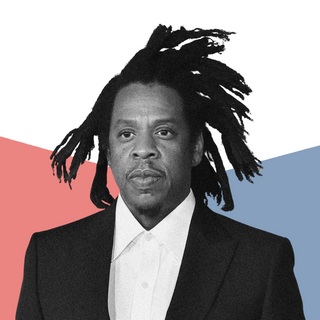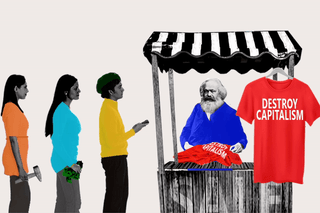
Anti‑Capitalism Is Cool. When Will It Be Revolutionary Again?
Railing against capitalism is a current intellectual aesthetic — and its mainstreaming takes away from what it actually means to be anti-capitalist.

Lately, there’s been talk of revolution. Not just any, the revolution, with a capital R. There’s some who speak of it in dating app bios and others who are waiting for its “sweet release” in Instagram captions of unrelated scenic photos. Still others express it through memes about eating the rich. But for all the talk about revolution online, there seems to be none in the offing. Indeed, most who profess allegiance to it do so with the biting irony of knowing that it’s likely to never come, because we’re all too busy. Welcome to modern anti-capitalism – increasingly less of a movement, more of an aesthetic.
The aestheticization of anti-capitalist sentiment has turned it into an edgy subculture that individuals can wear on the sleeve of their Che Guevara tee. People are no longer required to go beyond merely proclaiming a stance, thus precluding the possibility of any meaningful change.
It’s a unique moment in time where most young people either expressly disavow capitalism or at least are having conversations about it. The sentiment has even reached the indie music scene in India with The F16s recently releasing an album called Is It Time to Eat the Rich Yet?,which juxtaposes kaleidoscopic soundscapes with hopeless lyrics spelling doom for humanity as a whole.
Talking about capitalism is now mainstream in a way that it rarely was just a few years ago. It’s also become a stand-in for an overall dissatisfaction with modern life: hustle culture, crummy jobs, deteriorating health, less room for play, and more companies vying for our attention spans all share a common root, and young people have understood this.
But there’s a defeatism inherent in the framing of frustration against capitalism that makes the inescapable capitalist reality a self-fulfilling prophecy – if we’re already resigned to the possibility that we’ll live and die under capitalism, we really just might.
Consider also the fact that t-shirts that say “Capitalism Sucks” in big bold letters must be bought on Amazon, and the device with which we can Tweet against capitalism was, in all probability, made using children’s labor at some point in the global supply chain. Capitalism has created conditions that make it impossible to take a stand against it outside itself. It is self-evident and always reproducing itself – even through discourse that disavows it.
It’s what theorist Mark Fisher called “capitalist realism” – the idea that capitalism is the only plausible reality, and any alternative would be too unrealistic to imagine. So we stop imagining altogether. “In a capitalist realist system, expressions of opposition to the socio-political situation, from Nirvana to The Hunger Games, are always-already transformed by the smooth logic of capitalism into its very products for sale,” notes an LSE blog about the idea.
Being anti-capitalist, then, is rebranded as cynical nihilism that wins favor among the disenchanted neo-Gatsbys of the urbane. They ironically indulge in material excess with the knowledge that nothing really matters, the Earth will be destroyed soon, and Bezos and Musk will be our overlords in whatever post-apocalyptic techno-Valhalla awaits.
But there’s proof to show that all this hopelessness is an illusion. Just recently, a wave of student-protests against Chile’s inequality led to a rewriting of the country’s dictator-era Constitution. Young people were key to this anti-capitalist resistance, and it happened just under three years ago.
Closer to home, the recent farmers’ protests in India took on an anti-capitalist flavor by recognizing capitalism’s role in fuelling fascism and inequality in the country. These were moments of reckoning and change – showing that revolution is possible.
Related on The Swaddle:
How Self‑Care Went From Scented Candles to Affirmations, and Why It Still Doesn’t Help
For many whose lives have always been precarious in the offline world, anti-capitalism was never about the aesthetic; it was an urgent call to action with clearly defined goals. These could be anything from unionizing, protesting privatization, labor strikes calling for a bandh in consumer shops, or a general strike preventing access to services. Feminist anti-capitalist movements have recognized how unpaid labor forms the bedrock of capitalism, where women’s carework in the home or otherwise reproduces workers’ labor power to turn more profits for capitalists. Movements calling for wages for housework, and even boycotting housework (as with the #WeStike movement in Latin America), not only had a systemic critique but also actioned upon them in ways that had tangible consequences. Occupy Wall Street, for instance, was one that ignited widespread anger against the financial institutions that dictate our lives and played an instrumental role in radicalizing many who witnessed it stand against capitalism.
India too has had a rich history of anti-capitalist activism and protest, and many leaders have paid dearly for their role in acting against the state and corporations; the Bhima Koregaon 15, for instance, include those who dedicated their lives to labor movements and anti-caste activism.
And yet, there remains a social media-fuelled sensibility that overemphasizes the doom – almost as if everyone’s in on a secret that it’s all hopeless in the end.
The internet mediating much of our lives and learning may have something to do with it. With Instagram, TikTok (where it is legal, at least), and importantly, Twitter threads serving as the primary teaching tools for anti-capitalist discourse, the very idea of revolution occupies the digital spaces bestowed upon us by capitalist tech monopolies. Ultimately then, Karl Marx is reduced to nothing more than a self-aware, edgy meme.
Online, there’s no cohesive strategy, direction, or goal underlying what seems to be a moment of discontent against capitalism. A few individuals (billionaires) are earmarked as the villains rather than the systems that created them. We know what the impacts of capitalism are: climate change, inequality, and a declining quality of life. But we’re still not quite sure what to do about it. And the problem is that discourse about capitalism has been snatched and sealed into the self-preserving orbs of digital algorithmic content – a space that forecloses many revolutionary possibilities before they have the chance to be dreamed up.
Our content and consumption being predetermined for us by algorithms also distances us from critical histories – as well as movements occuring in the present moment – that can serve as blueprints. Through a sleight of hand, social media platforms hijack powerful ideas and information that used to be part of the commons into generators of profit.
Surveillance capitalism and the monopoly of Big Tech further make it difficult to get on the ground again. Protestors are increasingly identified and punished in real time, which is made possible through the cooperation of tech and hostile governments. With the resulting inordinate power to influence everything from democracies, elections, and even military action fuelling genocide (as Facebook has been accused of enabling in Myanmar), the Internet may just be the most undemocratic democratic space we have ever witnessed.
It’s led to an oversimplification of concepts and a polarization online that homogenizes any vaguely progressive idea as “left.” With the term itself signifying an anti-capitalist stance, it’s easier than ever for all manner of takes, ideas, and people to be lumped into the same umbrella of being against something, without clear consensus on what they’re for.
Online conversations are taken over by in-fighting, virtue-signaling, and monologues that at their very core share something in common: a relentless individualism that puts one’s own interests at the center of their politics. This, by its very nature, isn’t anti-capitalist – on the contrary, it’s the foundational value of capitalism’s dark spawn, neoliberalism.
There’s arguably no better example of how anti-capitalism became an tech-fulled, intellectual aesthetic – the conversational equivalent of dark academia, if you will – than its proliferation on dating apps. These spaces are notorious for their hyper-optimization, complete with carefully curated bios and personal characteristics that show rather than tell who somebody is in a small, mobile-optimized rectangular frame. And where one might have overplayed physical attributes, now it’s gauche to do so. Instead, openly professing edge by calling on potential partners to dismantle capitalism together is the new dating language. It not only blunts the edge of what it means to be anti-capitalist, it normalizes it to the point of banality – making “dismantling capitalism” sound almost like an unreal joke and keeping it further away from the imagination rather than bringing it closer.
Related on The Swaddle:
Why the Cult of ‘Doing What You Love’ Is Losing Steam
This is also evident in how the prescriptive measures we’re taught to combat capitalism are astonishingly tepid and do almost nothing to disrupt it – in fact, they come with their own, new hierarchies. Loud social media infographics instruct us to be ethical consumers by supporting small businesses. We’re told to switch to zero-waste, circular microeconomies that recycle our own rubbish. Veganism and thrifting feature prominently in the manual for not contributing to capitalism. But these strategies all have one thing in common, besides individualism – they’re all firmly rooted in the domain of lifestyle consumerism. To be a morally-in-the-clear individual when it comes to capitalism, one must consume ethically, we’re told. But this is just the problem – being anti-capitalist has much less to do with one’s individual conduct than with a collective solidarity and vision for change. Somewhere along the way, however, the emphasis shifted away from direct action to direct consumption – which alienates workers from consumers even more.
The fact that inequality is higher than ever, there are fewer welfare protections for vulnerable people, and next to no safeguards against rising inflation and unemployment speaks to how movements on the left have been crushed – even if talk of them is more alive than ever. But coexisting with these statistics are other surveys that repeatedly show how young people despise capitalism, and many place the blame for much of the world’s problems squarely on its shoulders. So why are things getting worse, not better?
A lack of vision for what the alternative could look like could be one reason for all this. A concrete vision requires work to engage with theory and history, but shortening attention spans leave room only for the Sparknotes version of anti-capitalist discourse. The biggest irony of espousing anti-capitalism today, then, is that revolution is no longer on the menu – only talking about it with a disaffected cynicism is.
It doesn’t mean that people are the problem; it’s that capitalism itself is cannibalizing all the discourse around it. It feels hopelessly exhausting to know what the problem is but come up against so many barriers to doing something about it. Nowhere is this better depicted than in Bo Burnham’s Inside, a comedy special where he laments about the state of the world in a depressive fugue, from various corners in his apartment. It feels like there’s nothing to do but sigh, say something, and move on – which has made us all attached to the idea of anti-capitalism but without the motivation to act on it.
But as Fisher points out, capitalist realism is an illusion created by capitalism itself to make it seem like it is the only option. When tech monopolies like Meta control the information we receive and share and Amazon crushes labor unions, it’s hard to know what the resistance looks like – even when it is happening in front of our eyes. Many have begun to posit that rejecting surveillance capitalism itself has to be the way forward.
Shoshanna Zuboff, who coined the term “surveillance capitalism,” says: “What is abrogated here [under surveillance capitalism] is our right to the future tense, which is the essence of free will, the idea that I can project myself into the future and thus make it a meaningful aspect of my present.” If everything we say and do is watched, it makes our speech and action less radical by default. Resisting the profit-seeking gaze itself, then, may restore our future back to us.
Rohitha Naraharisetty is a Senior Associate Editor at The Swaddle. She writes about the intersection of gender, caste, social movements, and pop culture. She can be found on Instagram at @rohitha_97 or on Twitter at @romimacaronii.
Related


Taking 10‑Minute ‘Micro‑Breaks’ Helps Prevent Burnout, Shows Study
